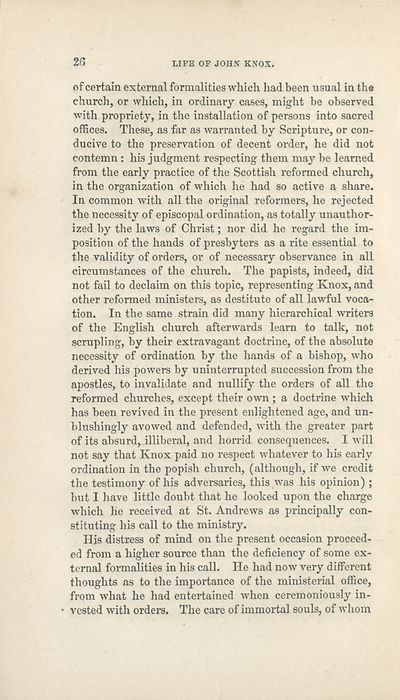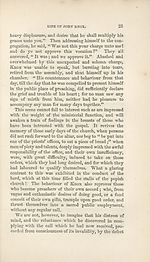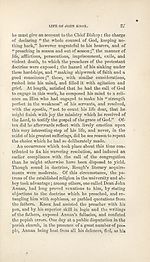Download files
Complete book:
Individual page:
Thumbnail gallery: Grid view | List view

LIFE OF JOHN KNOX.
2G
of certain external formalities which had been usual in th*
church, or which, in ordinary cases, might be observed
with propriety, in the installation of persons into sacred
offices. These, as far as warranted by Scripture, or con¬
ducive to the preservation of decent order, he did not
contemn : his judgment respecting them may be learned
from the early practice of the Scottish reformed church,
in the organization of which he had so active a share.
In common with all the original reformers, he rejected
the necessity of episcopal ordination, as totally unauthor¬
ized by the laws of Christ; nor did he regard the im¬
position of the hands of presbyters as a rite essential to
the validity of orders, or of necessary observance in all
circumstances of the church. The papists, indeed, did
not fail to declaim on this topic, representing Knox, and
other reformed ministers, as destitute of all lawful voca¬
tion. In the same strain did many hierarchical writers
of the English church afterwards learn to talk, not
scrupling, by their extravagant doctrine, of the absolute
necessity of ordination by the hands of a bishop, who
derived his powers by uninterrupted succession from the
apostles, to invalidate and nullify the orders of all the
reformed churches, except their own; a doctrine which
has been revived in the present enlightened age, and un-
blushingly avowed and defended, with the greater part
of its absurd, illiberal, and horrid consequences. I will
not say that Knox paid no respect whatever to his early
ordination in the popish church, (although, if we credit
the testimony of his adversaries, this was his opinion) ;
but I have little doubt that he looked upon the charge
which he received at St. Andrews as principally con¬
stituting his call to the ministry.
His distress of mind on the present occasion proceed¬
ed from a higher source than the deficiency of some ex¬
ternal formalities in his call. He had now very different
thoughts as to the importance of the ministerial office,
from what he had entertained when ceremoniously in¬
vested with orders. The care of immortal souls, of whom
2G
of certain external formalities which had been usual in th*
church, or which, in ordinary cases, might be observed
with propriety, in the installation of persons into sacred
offices. These, as far as warranted by Scripture, or con¬
ducive to the preservation of decent order, he did not
contemn : his judgment respecting them may be learned
from the early practice of the Scottish reformed church,
in the organization of which he had so active a share.
In common with all the original reformers, he rejected
the necessity of episcopal ordination, as totally unauthor¬
ized by the laws of Christ; nor did he regard the im¬
position of the hands of presbyters as a rite essential to
the validity of orders, or of necessary observance in all
circumstances of the church. The papists, indeed, did
not fail to declaim on this topic, representing Knox, and
other reformed ministers, as destitute of all lawful voca¬
tion. In the same strain did many hierarchical writers
of the English church afterwards learn to talk, not
scrupling, by their extravagant doctrine, of the absolute
necessity of ordination by the hands of a bishop, who
derived his powers by uninterrupted succession from the
apostles, to invalidate and nullify the orders of all the
reformed churches, except their own; a doctrine which
has been revived in the present enlightened age, and un-
blushingly avowed and defended, with the greater part
of its absurd, illiberal, and horrid consequences. I will
not say that Knox paid no respect whatever to his early
ordination in the popish church, (although, if we credit
the testimony of his adversaries, this was his opinion) ;
but I have little doubt that he looked upon the charge
which he received at St. Andrews as principally con¬
stituting his call to the ministry.
His distress of mind on the present occasion proceed¬
ed from a higher source than the deficiency of some ex¬
ternal formalities in his call. He had now very different
thoughts as to the importance of the ministerial office,
from what he had entertained when ceremoniously in¬
vested with orders. The care of immortal souls, of whom
Set display mode to:
![]() Universal Viewer |
Universal Viewer | ![]() Mirador |
Large image | Transcription
Mirador |
Large image | Transcription
| Antiquarian books of Scotland > Scotland/Scots > Life of John Knox ; and, The life of Alexander Henderson > (44) |
|---|
| Permanent URL | https://digital.nls.uk/131832832 |
|---|
| Description | Thousands of printed books from the Antiquarian Books of Scotland collection which dates from 1641 to the 1980s. The collection consists of 14,800 books which were published in Scotland or have a Scottish connection, e.g. through the author, printer or owner. Subjects covered include sport, education, diseases, adventure, occupations, Jacobites, politics and religion. Among the 29 languages represented are English, Gaelic, Italian, French, Russian and Swedish. |
|---|

